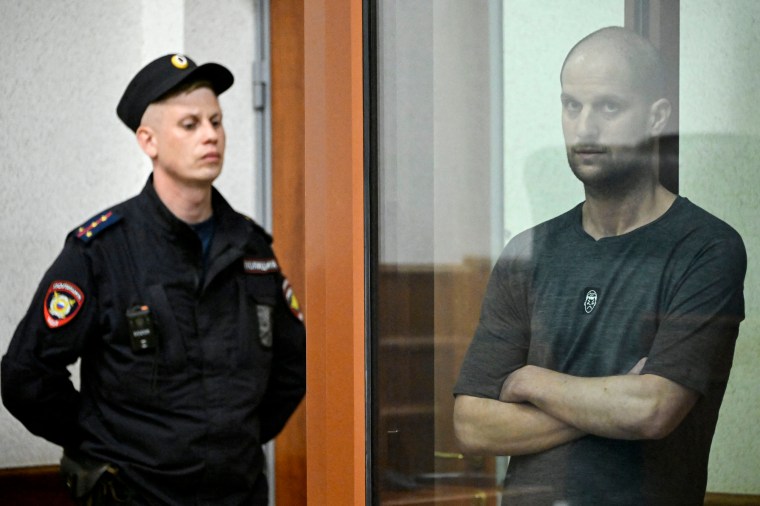America held hostage
Rewarding thugs is not an adequate policy response.
By Clifford D. May
JNS
Jul 24, 2024
U.S. journalist Evan Gershkovich, sentenced by a Russian judge to 16 years on charges of espionage, stands inside a glass defendant’s cage during the court hearing on July 19, 2024.
To no one’s surprise, Evan Gershkovich, a U.S. citizen and accredited foreign correspondent for The Wall Street Journal, was sentenced by a Russian court last Friday to 16 years in a high-security penal colony on charges of espionage.
Mr. Gershkovich, 32, was “wrongfully convicted in a hurried, secret trial that the U.S. government has condemned as a sham,” the Journal reported.
Since his arrest in March of last year, Russian authorities have produced not a shred of evidence against him.
What comes next is “hostage diplomacy,” an Orwellian term, an admission of American weakness, an acknowledgement that the U.S. has no intention of punishing anyone for imprisoning an innocent American nor any plan to deter those will do so in the future.
Look, I understand that anyone whose loved one is unjustly imprisoned wants that loved one freed—at whatever price.
But rewarding hostage-taking today incentivizes hostage-taking tomorrow. America’s leaders should at least be wrestling with this conundrum.
In 2015, President Barack Obama established the Office of the Special Presidential Envoy for Hostage Affairs. The envoy’s “one overriding goal,” then-Secretary of State John Kerry proclaimed, was to use “diplomacy to secure the safe return of Americans held hostage overseas.”
That may work in some cases, but what’s the chance that American diplomats can talk Russian strongman Vladimir Putin or Iranian dictator Ali Khamenei into releasing their hostages?
A former CIA agent told me last week about another approach—one the U.S. is unlikely to choose.
In 1986, there were credible reports that four Soviet diplomats had been kidnapped by Hezbollah in Lebanon. In response, the KGB killed a relative of a senior Hezbollah leader, and then sent body parts of the deceased relative to that leader, along with a note warning that other relatives would suffer the same fate if the diplomats were not released. They were—promptly.
“This is the way the Soviets operate,” an unnamed “observer” told The Jerusalem Post at the time. “And this is the language Hezbollah understands.’”
Because we Americans don’t use KGB methods and because diplomatic persuasion falls short, the U.S. often ends up rewarding hostage-takers.
In 2009, Obama paid $1.5 million to Iran’s rulers to gain the release of three American hostages kidnapped along the Iran-Iraq border.
In 2022, President Joe Biden secured the release from Russia of basketball star Brittney Griner (who had admitted entering the country with cannabis oil) in exchange for the release of Viktor Bout, a Russian arms dealer known as the “Merchant of Death” who had been serving a 25-year prison sentence for conspiring to sell weapons to people who planned to kill Americans.
In September of last year, Biden unfroze at least $6 billion of Iranian assets in exchange for the release of five American hostages.
I could cite additional examples.
The result is that despotic rulers can say to thugs: “There’s an individual abroad I need you to eliminate. Should you get caught, the jails in Western countries aren’t like those in Russia or Iran. Before long, we’ll arrest an American, convict him on some charge, real or invented, and then swap him for you. The Americans will boast that their diplomacy brought another American home. Candy from a baby!”
This suggests how the Gershkovich case may play out.
Speaking with Tucker Carlson in February, Mr. Putin mentioned a “patriot” who had “eliminated a bandit in one of the European capitals.”
That was almost certainly a reference to Vadim Krasikov, a Russian national linked to the FSB, the Russian security service, now serving a life sentence in Germany for murdering—with a silenced Glock 26 in a Berlin park in broad daylight in 2019—exiled Chechen rebel leader Zelimkhan Khangoshvili.
If this is indeed what Mr. Putin wants, “hostage diplomacy” will require American diplomats to convince German leaders to release Mr. Krasikov in exchange for which Mr. Putin will free Mr. Gershkovich.
But that scenario, as Ulrich Lechte of the Free Democratic Party told the BBC in March, will send “the political signal that Russia can commit further murders on our territory, which will then be released and thus remain unpunished.”
What’s the alternative, if not for Mr. Gershkovich and other Americans held in Russia—e.g., Radio Free Europe/Radio Liberty journalist Alsu Kurmasheva and U.S. Marine veteran Paul Whelan—but for others who will be wrongfully detained in the future?
My colleague Richard Goldberg, a former National Security Council official, makes a persuasive case that hostage-taking “is not a form of enhanced diplomacy; it is gray-zone warfare” requiring “aggressive retaliation with room to escalate within a gray-zone battlespace.”
That would include onerous economic sanctions on everyone involved in hostage-taking, along with “cyberattacks, information operations and other clandestine initiatives” designed to demonstrate that “the cost of seizing an American outweighs any potential benefit.”
I’ll put another idea on the table: A little skillful diplomacy could result in a kind of NATO Article 5 on hostage-taking: an agreement among America’s allies that, any time one of their citizens is “wrongfully detained,” they will all expel the ambassadors of the criminal regime, recall their own ambassadors and coordinate sanctions tough enough to seriously damage the economy of the offending regime.
The bottom line: For America to be safe and for Americans to be safe, it’s not sufficient that we and our allies be stronger than our enemies. The imbalance—militarily and economically—needs to be overwhelming.
Would that be Donald Trump’s highest priority should he get a second term?
I have no idea, but I will say this: “Make America great again” will be a meaningless phrase so long as despots such as Mr. Putin and Mr. Khamenei are playing Americans for fools time and time again.
Originally published by The Washington Times.

No comments:
Post a Comment